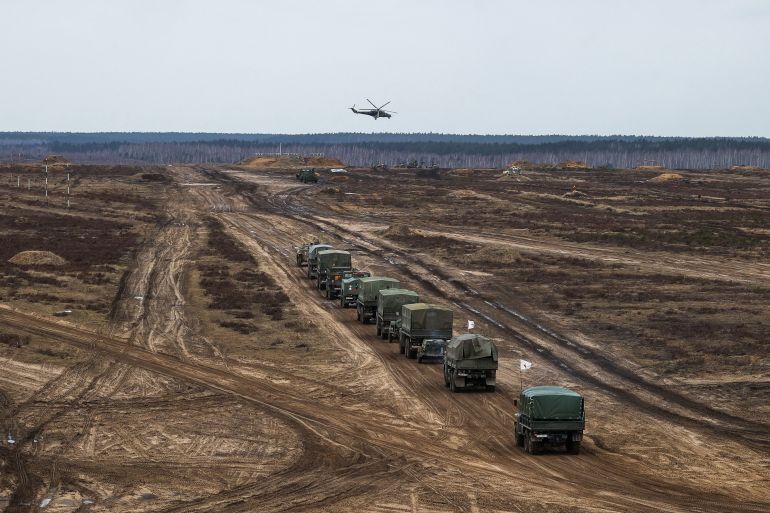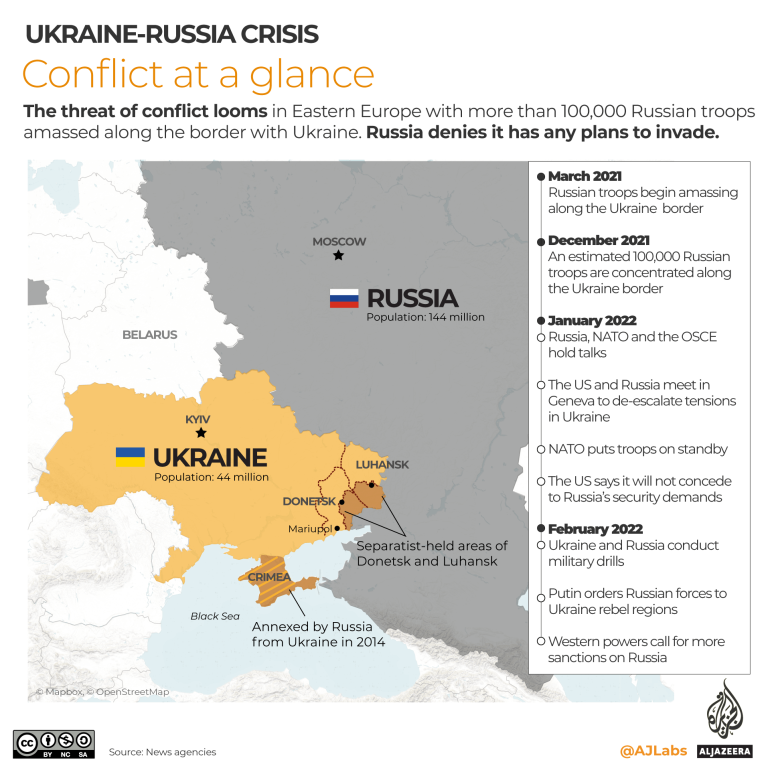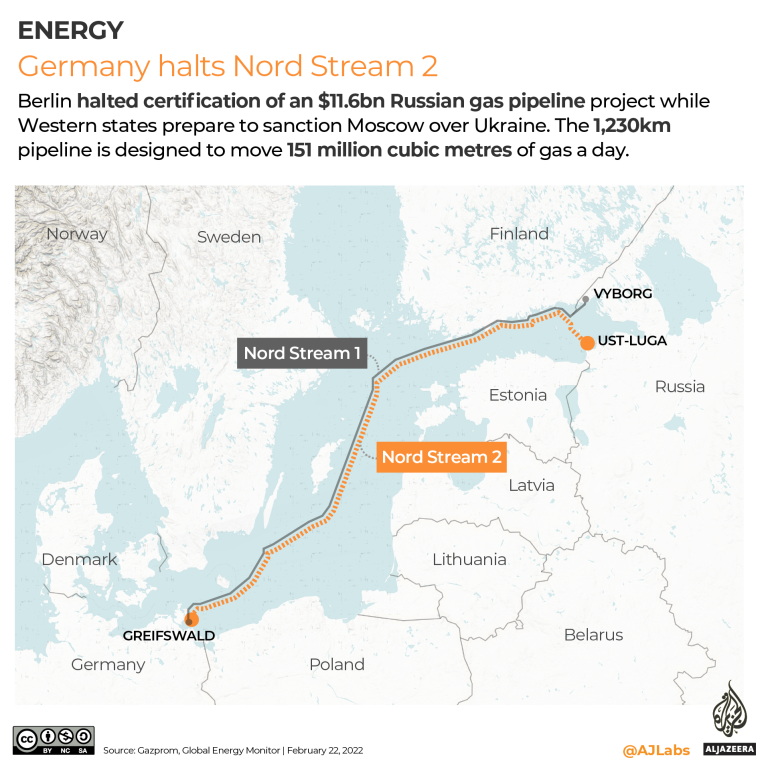Russia-Ukraine crisis: 5 things to know about Putin’s bold move
President Putin has recognised the independence of Ukraine’s two rebel regions, further exacerbating tensions with the West.

Images of Russian military vehicles entering areas held by Moscow-backed separatists in Ukraine’s east have shocked the world.
President Vladimir Putin said they were part of a “peacekeeping mission”, hours after he recognised the regions’ independence.
Keep reading
list of 4 itemsGermany accuses Russia of ‘intolerable’ cyberattack, warns of consequences
Russia-Ukraine war: List of key events, day 799
How do American universities make their money?
In a lengthy televised address to the nation on Monday, Putin announced the surprise decision, departing from a years-long policy which has seen Russia aligned with United Nations members that do not recognise the self-proclaimed Donetsk and Luhansk “people’s republics”.
The move has fuelled fears of an all-out war in Europe.
Swiftly condemned by several countries, the development triggered immediate sanctions by the United States and marathon emergency talks at the UN Security Council (UNSC).
Meanwhile on the ground, fighting in eastern Ukraine intensifies with Kyiv reporting fatalities and injuries among soldiers, blaming shelling by pro-Russian separatists. Russia’s Interfax news agency cited a separatist official as saying Ukrainian “saboteurs” detonated a mine on a road killing three civilians.
How did we get here? Here is what you should know…
1. How did the latest crisis begin?
On Sunday, Putin reiterated his frustration that Russia’s demands for a rewriting of Europe’s security arrangements had been repeatedly rebuffed.
He wants the US and NATO to promise that they would never allow Ukraine to become a member of the alliance, saying that Ukraine should be a buffer, neutral state. Moscow has also called for NATO to cease all military activity in Eastern Europe, blaming it for undermining the region’s security.
But Western leaders have rejected those demands. They say the Kremlin cannot be allowed an effective veto on Kyiv’s foreign policy decisions and have defended NATO’s “open-door policy”, which grants any European nation the right to ask to join.
In what many observers say is an attempt to menace Ukraine, Moscow has amassed an estimated 150,000 troops along the shared border.
Western nations led by Washington are convinced that Russia is planning a large-scale attack. Moscow denies this, and says it can move its troops and military equipment wherever it sees fit – in its own territory – claiming its actions are of self-defence.
2. What’s the deal with the two separatist regions?
Russian-backed separatists in Ukraine’s Donetsk and Luhansk regions – in an area collectively known as the Donbas – broke away from Ukrainian government control in 2014 and proclaimed themselves independent “people’s republics”.
The move led to a bloody conflict between Ukraine and Russia-backed forces, which partly ended with the signing of the Minsk agreement a year later.
The deal called for a ceasefire in the region, the departure of foreign forces and a degree of autonomy for the separatist-held areas.
But Russia says that it was not party to the conflict and that along the 420km contact line, fighting never really stopped – accusing Kyiv of breaching the ceasefire.
Ukraine accuses Moscow of the same.
While the conflict has simmered for a year, the Organization for Security and Co-operation in Europe (OSCE) has recorded more than 2,000 ceasefire violations, including 1,100 explosions between February 18 and 20 – a relatively high number.
Putin is full of grievances against the West – in a speech on Monday, visibly angry, he repeated his belief that eastern Ukraine is ancient Russian land, delving into history as far back as the Ottoman empire.
“I deem it necessary to make a decision that should have been made a long time ago – to immediately recognise the independence and sovereignty of the Donetsk People’s Republic and the Luhansk People’s Republic,” he said, before signing a decree.

3. How have international powers reacted?
US President Joe Biden immediately signed an executive order to halt US business activity in the breakaway regions.
The European Union is expected to agree unanimously to a set of “robust and massive” sanctions against Russia on Tuesday. Chancellor Olaf Scholz says Germany has taken steps to halt the process of certifying the Nord Stream 2 gas pipeline, which brings natural gas from Russia to Germany.
China, a Russia ally, said it was concerned while Japan said it was ready to join international sanctions on Moscow in the event of a full-scale invasion.
Australian Prime Minister Scott Morrison said Russia should “unconditionally withdraw” from Ukrainian territory and stop threatening its neighbours.
Breaking away from the chorus of condemnation, Syria’s government said it “supports” Putin’s move and “will cooperate” with the two separatist regions.

4. What was said at the UNSC?
UN Under-Secretary-General for Political and Peacebuiding Affairs Rosemary DiCarlo opened the session late Monday with a warning that “the risk of major conflict is real and needs to be prevented at all costs”.
Russia’s UN ambassador, Vassily Nebenzia, said the US and its Western allies were egging on Ukraine toward “an armed provocation”. He accused Ukraine of sharply increasing shelling in residential areas of the separatist regions over the past weekend and in some Russian towns and villages near the border.
Sergiy Kyslytsya, Ukraine’s UN ambassador, demanded that Moscow cancel its recognition, immediately withdraw “occupation troops” sent there, and return to negotiations.
Kyslytsya condemned Putin’s “illegal and illegitimate” decision.
China sounded a cautious note, calling for restraint and a diplomatic solution.
Kenya’s ambassador to the UN Martin Kimani condemned Russia’s move, saying that “multilateralism lies on its deathbed tonight”. A video of his speech has been widely shared – and lauded – on social media.
If you're gonna listen to any speech about #Ukraine 🇺🇦, let it be this one.
The Kenya ambassador to the UNSC perfectly explains how people across Africa understand Ukraine, and what the Kremlin's acts of aggression mean in our post-colonial world. pic.twitter.com/0gTuAni0DC
— Thomas van Linge (@ThomasVLinge) February 22, 2022
5. What lies ahead?
Worries loom about the impact of a European war, but some believe that there is still room for diplomacy.
Before Putin’s announcement, he had agreed to talk to Biden – in principle – about the crisis. After his decision, Russian Foreign Minister Sergey Lavrov said he was still interested in pursuing a diplomatic solution.
As many observers have noted, the crisis is unpredictable and no one really knows what Putin is trying to achieve.
Until Monday, Russia had refused to recognise the two “republics”. Now that it has gone back on its word, trust in statements emanating from the Kremlin have fallen further.